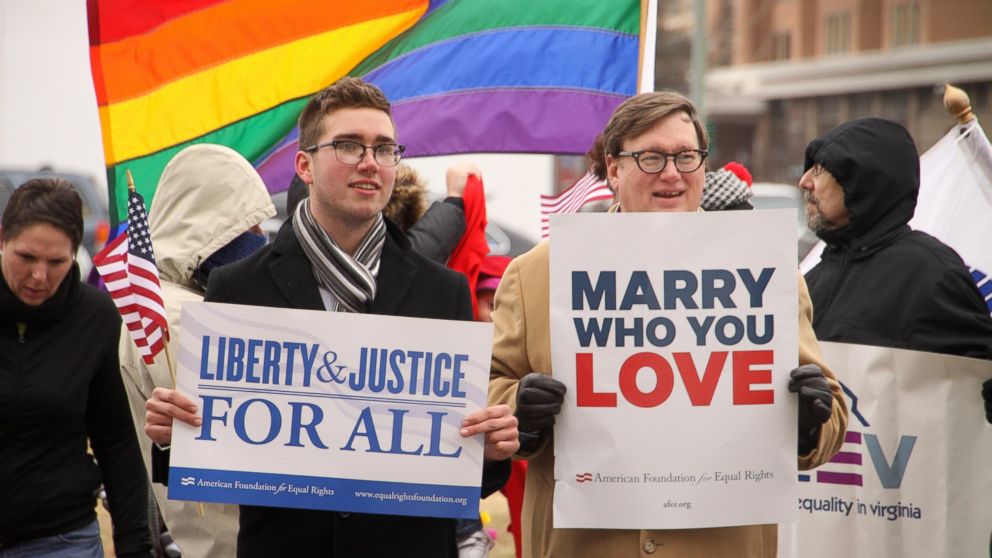Gay Marriage and 6 Other Big Issues on Supreme Court Agenda
The court is set to tackle pregnancy discrimination, among other issues.

— -- Hovering over the Supreme Court’s 2014 docket of interesting cases is the blockbuster issue of gay marriage. The justices will meet behind closed doors today to discuss whether to hear one or more cases challenging marriage bans in five states.
“This set of issues is the greatest civil rights issue of our time,” says former acting Solicitor General Neal Katyal, who is representing one set of challengers.
Since the Supreme Court’s historic gay marriage rulings in 2013, three appellate courts have struck bans in five states.
In an unusual circumstance, Katyal -- and the other challengers -- have asked the Supreme Court to step in despite having won in the lower court.
Here’s the sentiment according to Katyal: “Let us have our shot in court, and win on a national level.”
The court could decide not to get involved at all, but Irv Gornstein, executive director of the Supreme Court Institute at Georgetown Law, thinks it is not a question of “if”, but “when”. At a recent event he said that the court might take a few weeks to discuss which cases to take but that the justices will eventually grant cert and “give a definitive answer this term.”
Overshadowed by the gay marriage debate are the actual cases which the court will begin considering when oral arguments begin on Oct. 6. Here’s a rundown of some of the other cases:
1. FREE SPEECH IN THE AGE OF FACEBOOK

After his wife left him, Anthony D. Elonis took to posting violent passages on Facebook. "Did you know that it's illegal for me to say I want to kill my wife?" he posted in one. "Hell hath no fury like a crazy man in a kindergarten class" he wrote in another. He was convicted under a federal threat statue. But Elonis argues he never intended to carry out a threat, and he was expressing himself at times using song lyrics that are similar to the music produced by rap star Eminem. At issue in the case is under what circumstances the government can punish speech as a threat. It’s an interesting intersection of Internet speech, rap music and the First Amendment.
2. RELIGIOUS FREEDOM IN PRISON
Gregory Holt aka Abdul Maalik Muhammad pled guilty in 2005 for threatening to kidnap and harm the daughters of George W. Bush. In 2010 he was convicted of first-degree domestic battering and sentenced to life. Once in prison, Holt said he wanted to grow a beard in accordance with his Muslim faith. But while the Arkansas Department of Corrections allows mustaches, it forbids other facial hair. Quarter inch beards are permitted only for a diagnosed dermatological problem. Holt says the prison is violating his rights under a federal law specifically designed to protect religious exercise for prisoners. But corrections officials say the court should give deference to a policy that was crafted to keep inmates from hiding contraband and protect security.
This case explores a long-time conflict between Congress and the Executive with Middle East politics as the back drop. When Menachem Binyamin Zivotofsky was born in Jerusalem in 2002, his American parents sought to have “Israel” listed on his passport pursuant to a law passed by Congress that allows them to do so. But State Department officials refused. The law is not enforced by the State Department because it runs counter to its policy to take no position on one of the most contentious issues in history: The political status of Jerusalem. The Zivotofskys sued. In legal briefs, lawyers for Secretary of State John Kerry say the law “impermissibly impinges on the Executive Branch’s exclusive constitutional authority to decide whether and on what terms to recognize a foreign sovereign.” Lawyers for the Zivotofskys respond that Congress has broad power over passports and that the place-of-birth entry on the passport is designed not for any foreign policy purpose, but to identify the passport holder.
5. ALABAMA REDISTRICTING
The Alabama Legislative Black Caucus and the Alabama Democratic Conference are challenging a 2012 redistricting plan adopted by a Republican-led legislature. They say the plan packed African Americans into existing majority-black districts and diluted their influence. Alabama’s attorney general says in part that the drafters of the plan were seeking to comply with the Voting Rights Act by keeping the majority-black districts under the new plan about the same as the ones in the previous plans. This will be the first voting rights case heard by the justices since a divided court struck down a key provision of the Voting Rights Act.
6. PREGNANCY DISCRIMINATION
Peggy Young, an employee of United Parcel Service, became pregnant in 2006 and was told by her doctor not to lift anything heavier than 20 pounds for the first 20 weeks or pregnancy. Young asked her supervisor for an accommodation for her pregnancy-related lifting restriction. She was told that UPS--governed by a collective bargaining agreement--did not give light duty for pregnancy. Young sued under the Pregnancy Discrimination Act (PDA) arguing that the law requires employers to provide the same accommodations it provides to non-pregnant employees who are similar in their ability or inability to work. UPS indeed offers light work accommodations to a subset of workers who are injured on the job, have a disability defined by the Americans with Disabilities Act, or lose their Department of Transportation certification. But UPS says it has a pregnancy-neutral policy and that Young was treated in exactly the same way the company treats all employees—pregnant or not—who are unable to perform essential functions of the job as a result of an off-the-job injury or condition.




